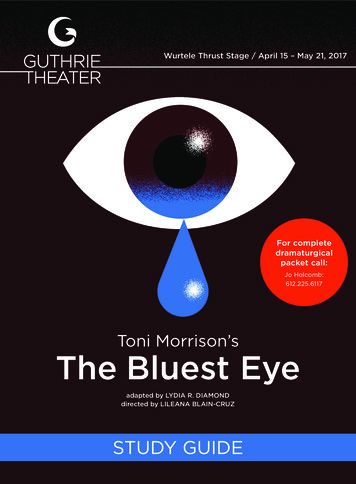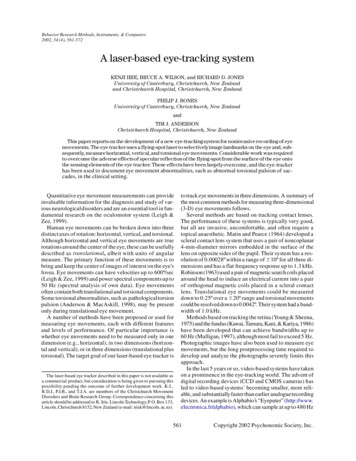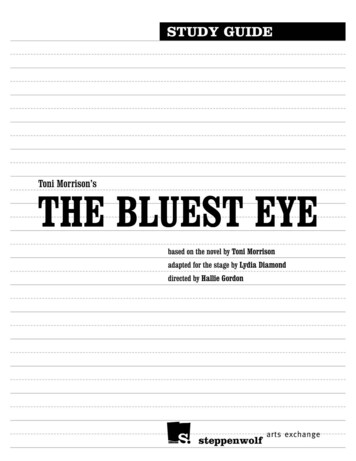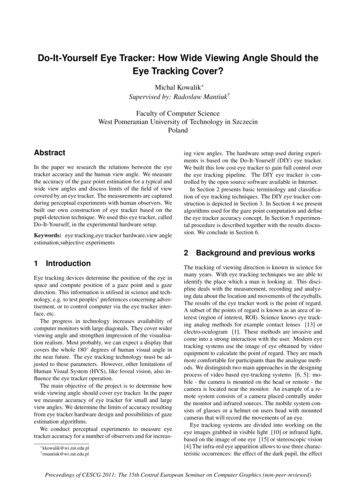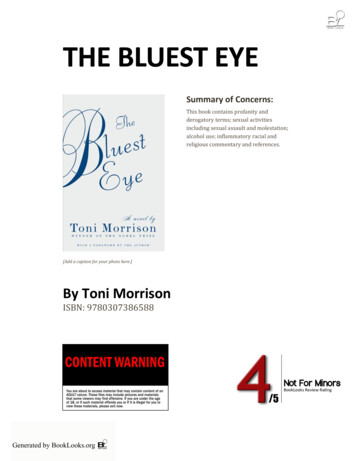
Transcription
OceanofPDF.com
ContentsTitle PageDedicationForewordThe Bluest EyeAutumnWinterSpringSummerAbout the AuthorAlso by Toni MorrisonAcclaim for Toni MorrisonCopyrightOceanofPDF.com
To the two who gave me lifeand the one who made me freeOceanofPDF.com
ForewordThere can’t be anyone, I am sure, who doesn’t know what it feels like to bedisliked, even rejected, momentarily or for sustained periods of time. Perhapsthe feeling is merely indifference, mild annoyance, but it may also be hurt. Itmay even be that some of us know what it is like to be actually hated—hatedfor things we have no control over and cannot change. When this happens, itis some consolation to know that the dislike or hatred is unjustified—that youdon’t deserve it. And if you have the emotional strength and/or support fromfamily and friends, the damage is reduced or erased. We think of it as thestress (minor or disabling) that is part of life as a human.When I began writing The Bluest Eye, I was interested in something else.Not resistance to the contempt of others, ways to deflect it, but the far moretragic and disabling consequences of accepting rejection as legitimate, as selfevident. I knew that some victims of powerful self-loathing turn out to bedangerous, violent, reproducing the enemy who has humiliated them over andover. Others surrender their identity; melt into a structure that delivers thestrong persona they lack. Most others, however, grow beyond it. But there aresome who collapse, silently, anonymously, with no voice to express oracknowledge it. They are invisible. The death of self-esteem can occurquickly, easily in children, before their ego has “legs,” so to speak. Couple thevulnerability of youth with indifferent parents, dismissive adults, and a world,which, in its language, laws, and images, re-enforces despair, and the journeyto destruction is sealed.The project, then, for this, my first book, was to enter the life of the oneleast likely to withstand such damaging forces because of youth, gender, andrace. Begun as a bleak narrative of psychological murder, the main charactercould not stand alone since her passivity made her a narrative void. So Iinvented friends, classmates, who understood, even sympathized, with her
plight, but had the benefit of supportive parents and a feistiness all their own.Yet they were helpless as well. They could not save their friend from theworld. She broke.The origin of the novel lay in a conversation I had with a childhood friend.We had just started elementary school. She said she wanted blue eyes. Ilooked around to picture her with them and was violently repelled by what Iimagined she would look like if she had her wish. The sorrow in her voiceseemed to call for sympathy, and I faked it for her, but, astonished by thedesecration she proposed, I “got mad” at her instead.Until that moment I had seen the pretty, the lovely, the nice, the ugly, andalthough I had certainly used the word “beautiful,” I had never experienced itsshock—the force of which was equaled by the knowledge that no onerecognized it, not even, or especially, the one who possessed it.It must have been more than the face I was examining: the silence of thestreet in the early afternoon, the light, the atmosphere of confession. In anycase it was the first time I knew beautiful. Had imagined it for myself. Beautywas not simply something to behold; it was something one could do.The Bluest Eye was my effort to say something about that; to say somethingabout why she had not, or possibly ever would have, the experience of whatshe possessed and also why she prayed for so radical an alteration. Implicit inher desire was racial self-loathing. And twenty years later, I was stillwondering about how one learns that. Who told her? Who made her feel thatit was better to be a freak than what she was? Who had looked at her andfound her so wanting, so small a weight on the beauty scale? The novel pecksaway at the gaze that condemned her.The reclamation of racial beauty in the sixties stirred these thoughts, mademe think about the necessity for the claim. Why, although reviled by others,could this beauty not be taken for granted within the community? Why did itneed wide public articulation to exist? These are not clever questions. But in1962 when I began this story, and in 1965 when it began to be a book, theanswers were not as obvious to me as they quickly became and are now. Theassertion of racial beauty was not a reaction to the self-mocking, humorouscritique of cultural/racial foibles common in all groups, but against thedamaging internalization of assumptions of immutable inferiority originatingin an outside gaze. I focused, therefore, on how something as grotesque as thedemonization of an entire race could take root inside the most delicate
member of society: a child; the most vulnerable member: a female. In tryingto dramatize the devastation that even casual racial contempt can cause, Ichose a unique situation, not a representative one. The extremity of Pecola’scase stemmed largely from a crippled and crippling family—unlike theaverage black family and unlike the narrator’s. But singular as Pecola’s lifewas, I believed some aspects of her woundability were lodged in all younggirls. In exploring the social and domestic aggression that could cause a childto literally fall apart, I mounted a series of rejections, some routine, someexceptional, some monstrous, all the while trying hard to avoid complicity inthe demonization process Pecola was subjected to. That is, I did not want todehumanize the characters who trashed Pecola and contributed to hercollapse.One problem was centering the weight of the novel’s inquiry on so delicateand vulnerable a character could smash her and lead readers into the comfortof pitying her rather than into an interrogation of themselves for the smashing.My solution—break the narrative into parts that had to be reassembled by thereader—seemed to me a good idea, the execution of which does not satisfyme now. Besides, it didn’t work: many readers remain touched but not moved.The other problem, of course, was language. Holding the despising glancewhile sabotaging it was difficult. The novel tried to hit the raw nerve of racialself-contempt, expose it, then soothe it not with narcotics but with languagethat replicated the agency I discovered in my first experience of beauty.Because that moment was so racially infused (my revulsion at what myschool friend wanted: very blue eyes in a very black skin; the harm she wasdoing to my concept of the beautiful), the struggle was for writing that wasindisputably black. I don’t yet know quite what that is, but neither that nor theattempts to disqualify an effort to find out keeps me from trying to pursue it.My choices of language (speakerly, aural, colloquial), my reliance for fullcomprehension on codes embedded in black culture, my effort to effectimmediate coconspiracy and intimacy (without any distancing, explanatoryfabric), as well as my attempt to shape a silence while breaking it are attemptsto transfigure the complexity and wealth of Black American culture into alanguage worthy of the culture.Thinking back now on the problems expressive language presented to me, Iam amazed by their currency, their tenacity. Hearing “civilized” languagesdebase humans, watching cultural exorcisms debase literature, seeing oneselfpreserved in the amber of disqualifying metaphors—I can say that my
narrative project is as difficult today as it was then.OceanofPDF.com
The Bluest EyeHere is the house. It is green and white. It has a red door. It is very pretty.Here is the family. Mother, Father, Dick, and Jane live in the green-and-whitehouse. They are very happy. See Jane. She has a red dress. She wants to play.Who will play with Jane? See the cat. It goes meow-meow. Come and play.Come play with Jane. The kitten will not play. See Mother. Mother is verynice. Mother, will you play with Jane? Mother laughs. Laugh, Mother, laugh.See Father. He is big and strong. Father, will you play with Jane? Father issmiling. Smile, Father, smile. See the dog. Bowwow goes the dog. Do youwant to play with Jane? See the dog run. Run, dog, run. Look, look. Herecomes a friend. The friend will play with Jane. They will play a good game.Play, Jane, play.Here is the house it is green and white it has a red door it is very pretty here isthe family mother father dick and jane live in the green-and-white house theyare very happy see jane she has a red dress she wants to play who will play
with jane see the cat it goes meow-meow come and play come play with janethe kitten will not play see mother mother is very nice mother will you playwith jane mother laughs laugh mother laugh see father he is big and strongfather will you play with jane father is smiling smile father smile see the dogbowwow goes the dog do you want to play do you want to play with jane seethe dog run run dog run look look here comes a friend the friend will playwith jane they will play a good game play jane aywithjanetheywillplayagoodgameplayjaneplayQuiet as it’s kept, there were no marigolds in the fall of 1941. We thought, atthe time, that it was because Pecola was having her father’s baby that themarigolds did not grow. A little examination and much less melancholy wouldhave proved to us that our seeds were not the only ones that did not sprout;nobody’s did. Not even the gardens fronting the lake showed marigolds thatyear. But so deeply concerned were we with the health and safe delivery ofPecola’s baby we could think of nothing but our own magic: if we planted theseeds, and said the right words over them, they would blossom, andeverything would be all right.It was a long time before my sister and I admitted to ourselves that nogreen was going to spring from our seeds. Once we knew, our guilt was
relieved only by fights and mutual accusations about who was to blame. Foryears I thought my sister was right: it was my fault. I had planted them too fardown in the earth. It never occurred to either of us that the earth itself mighthave been unyielding. We had dropped our seeds in our own little plot ofblack dirt just as Pecola’s father had dropped his seeds in his own plot ofblack dirt. Our innocence and faith were no more productive than his lust ordespair. What is clear now is that of all of that hope, fear, lust, love, and grief,nothing remains but Pecola and the unyielding earth. Cholly Breedlove isdead; our innocence too. The seeds shriveled and died; her baby too.There is really nothing more to say—except why. But since why is difficultto handle, one must take refuge in how.OceanofPDF.com
AutumnNuns go by as quiet as lust, and drunken men and sober eyes sing in the lobbyof the Greek hotel. Rosemary Villanucci, our next-door friend who livesabove her father’s café, sits in a 1939 Buick eating bread and butter. She rollsdown the window to tell my sister Frieda and me that we can’t come in. Westare at her, wanting her bread, but more than that wanting to poke thearrogance out of her eyes and smash the pride of ownership that curls herchewing mouth. When she comes out of the car we will beat her up, make redmarks on her white skin, and she will cry and ask us do we want her to pullher pants down. We will say no. We don’t know what we should feel or do ifshe does, but whenever she asks us, we know she is offering us somethingprecious and that our own pride must be asserted by refusing to accept.School has started, and Frieda and I get new brown stockings and cod-liveroil. Grown-ups talk in tired, edgy voices about Zick’s Coal Company and takeus along in the evening to the railroad tracks where we fill burlap sacks with
the tiny pieces of coal lying about. Later we walk home, glancing back to seethe great carloads of slag being dumped, red hot and smoking, into the ravinethat skirts the steel mill. The dying fire lights the sky with a dull orange glow.Frieda and I lag behind, staring at the patch of color surrounded by black. It isimpossible not to feel a shiver when our feet leave the gravel path and sinkinto the dead grass in the field.Our house is old, cold, and green. At night a kerosene lamp lights one largeroom. The others are braced in darkness, peopled by roaches and mice. Adultsdo not talk to us—they give us directions. They issue orders withoutproviding information. When we trip and fall down they glance at us; if wecut or bruise ourselves, they ask us are we crazy. When we catch colds, theyshake their heads in disgust at our lack of consideration. How, they ask us, doyou expect anybody to get anything done if you all are sick? We cannotanswer them. Our illness is treated with contempt, foul Black Draught, andcastor oil that blunts our minds.When, on a day after a trip to collect coal, I cough once, loudly, throughbronchial tubes already packed tight with phlegm, my mother frowns. “GreatJesus. Get on in that bed. How many times do I have to tell you to wearsomething on your head? You must be the biggest fool in this town. Frieda?Get some rags and stuff that window.”Frieda restuffs the window. I trudge off to bed, full of guilt and self-pity. Ilie down in my underwear, the metal in my black garters hurts my legs, but Ido not take them off, for it is too cold to lie stockingless. It takes a long timefor my body to heat its place in the bed. Once I have generated a silhouette ofwarmth, I dare not move, for there is a cold place one-half inch in anydirection. No one speaks to me or asks how I feel. In an hour or two mymother comes. Her hands are large and rough, and when she rubs the Vickssalve on my chest, I am rigid with pain. She takes two fingers’ full of it at atime, and massages my chest until I am faint. Just when I think I will tip overinto a scream, she scoops out a little of the salve on her forefinger and puts itin my mouth, telling me to swallow. A hot flannel is wrapped about my neckand chest. I am covered up with heavy quilts and ordered to sweat, which I do—promptly.Later I throw up, and my mother says, “What did you puke on the bedclothes for? Don’t you have sense enough to hold your head out the bed?Now, look what you did. You think I got time for nothing but washing upyour puke?”
The puke swaddles down the pillow onto the sheet—green-gray, withflecks of orange. It moves like the insides of an uncooked egg. Stubbornlyclinging to its own mass, refusing to break up and be removed. How, Iwonder, can it be so neat and nasty at the same time?My mother’s voice drones on. She is not talking to me. She is talking to thepuke, but she is calling it my name: Claudia. She wipes it up as best she canand puts a scratchy towel over the large wet place. I lie down again. The ragshave fallen from the window crack, and the air is cold. I dare not call her backand am reluctant to leave my warmth. My mother’s anger humiliates me; herwords chafe my cheeks, and I am crying. I do not know that she is not angryat me, but at my sickness. I believe she despises my weakness for letting thesickness “take holt.” By and by I will not get sick; I will refuse to. But fornow I am crying. I know I am making more snot, but I can’t stop.My sister comes in. Her eyes are full of sorrow. She sings to me: “Whenthe deep purple falls over sleepy garden walls, someone thinks of me .” Idoze, thinking of plums, walls, and “someone.”But was it really like that? As painful as I remember? Only mildly. Orrather, it was a productive and fructifying pain. Love, thick and dark as Alagasyrup, eased up into that cracked window. I could smell it—taste it—sweet,musty, with an edge of wintergreen in its base—everywhere in that house. Itstuck, along with my tongue, to the frosted windowpanes. It coated my chest,along with the salve, and when the flannel came undone in my sleep, theclear, sharp curves of air outlined its presence on my throat. And in the night,when my coughing was dry and tough, feet padded into the room, handsrepinned the flannel, readjusted the quilt, and rested a moment on myforehead. So when I think of autumn, I think of somebody with hands whodoes not want me to die.It was autumn too when Mr. Henry came. Our roomer. Our roomer. Thewords ballooned from the lips and hovered about our heads—silent, separate,and pleasantly mysterious. My mother was all ease and satisfaction indiscussing his coming.“You know him,” she said to her friends. “Henry Washington. He’s beenliving over there with Miss Della Jones on Thirteenth Street. But she’s too
addled now to keep up. So he’s looking for another place.”“Oh, yes.” Her friends do not hide their curiosity. “I been wondering howlong he was going to stay up there with her. They say she’s real bad off. Don’tknow who he is half the time, and nobody else.”“Well, that old crazy nigger she married up with didn’t help her headnone.”“Did you hear what he told folks when he left her?”“Uh-uh. What?”“Well, he run off with that trifling Peggy—from Elyria. You know.”“One of Old Slack Bessie’s girls?”“That’s the one. Well, somebody asked him why he left a nice good churchwoman like Della for that heifer. You know Della always did keep a goodhouse. And he said the honest-to-God real reason was he couldn’t take nomore of that violet water Della Jones used. Said he wanted a woman to smelllike a woman. Said Della was just too clean for him.”“Old dog. Ain’t that nasty!”“You telling me. What kind of reasoning is that?”“No kind. Some men just dogs.”“Is that what give her them strokes?”“Must have helped. But you know, none of them girls wasn’t too bright.Remember that grinning Hattie? She wasn’t never right. And their AuntieJulia is still trotting up and down Sixteenth Street talking to herself.”“Didn’t she get put away?”“Naw. County wouldn’t take her. Said she wasn’t harming anybody.”“Well, she’s harming me. You want something to scare the living shit out ofyou, you get up at five-thirty in the morning like I do and see that old hagfloating by in that bonnet. Have mercy!”
They laugh.Frieda and I are washing Mason jars. We do not hear their words, but withgrown-ups we listen to and watch out for their voices.“Well, I hope don’t nobody let me roam around like that when I get senile.It’s a shame.”“What they going to do about Della? Don’t she have no people?”“A sister’s coming up from North Carolina to look after her. I expect shewants to get aholt of Della’s house.”“Oh, come on. That’s a evil thought, if ever I heard one.”“What you want to bet? Henry Washington said that sister ain’t seen Dellain fifteen years.”“I kind of thought Henry would marry her one of these days.”“That old woman?”“Well, Henry ain’t no chicken.”“No, but he ain’t no buzzard, either.”“He ever been married to anybody?”“No.”“How come? Somebody cut it off?”“He’s just picky.”“He ain’t picky. You see anything around here you’d marry?”“Well no.”“He’s just sensible. A steady worker with quiet ways. I hope it works outall right.”“It will. How much you charging?”
“Five dollars every two weeks.”“That’ll be a big help to you.”“I’ll say.”Their conversation is like a gently wicked dance: sound meets sound, curtsies,shimmies, and retires. Another sound enters but is upstaged by still another:the two circle each other and stop. Sometimes their words move in loftyspirals; other times they take strident leaps, and all of it is punctuated withwarm-pulsed laughter—like the throb of a heart made of jelly. The edge, thecurl, the thrust of their emotions is always clear to Frieda and me. We do not,cannot, know the meanings of all their words, for we are nine and ten yearsold. So we watch their faces, their hands, their feet, and listen for truth intimbre.So when Mr. Henry arrived on a Saturday night, we smelled him. Hesmelled wonderful. Like trees and lemon vanishing cream, and Nu Nile HairOil and flecks of Sen-Sen.He smiled a lot, showing small even teeth with a friendly gap in the middle.Frieda and I were not introduced to him—merely pointed out. Like, here isthe bathroom; the clothes closet is here; and these are my kids, Frieda andClaudia; watch out for this window; it don’t open all the way.We looked sideways at him, saying nothing and expecting him to saynothing. Just to nod, as he had done at the clothes closet, acknowledging ourexistence. To our surprise, he spoke to us.“Hello there. You must be Greta Garbo, and you must be Ginger Rogers.”We giggled. Even my father was startled into a smile.“Want a penny?” He held out a shiny coin to us. Frieda lowered her head,too pleased to answer. I reached for it. He snapped his thumb and forefinger,and the penny disappeared. Our shock was laced with delight. We searched allover him, poking our fingers into his socks, looking up the inside back of hiscoat. If happiness is anticipation with certainty, we were happy. And while wewaited for the coin to reappear, we knew we were amusing Mama and Daddy.
Daddy was smiling, and Mama’s eyes went soft as they followed our handswandering over Mr. Henry’s body.We loved him. Even after what came later, there was no bitterness in ourmemory of him.She slept in the bed with us. Frieda on the outside because she is brave—itnever occurs to her that if in her sleep her hand hangs over the edge of the bed“something” will crawl out from under it and bite her fingers off. I sleep nearthe wall because that thought has occurred to me. Pecola, therefore, had tosleep in the middle.Mama had told us two days earlier that a “case” was coming—a girl whohad no place to go. The county had placed her in our house for a few daysuntil they could decide what to do, or, more precisely, until the family wasreunited. We were to be nice to her and not fight. Mama didn’t know “whatgot into people,” but that old Dog Breedlove had burned up his house, goneupside his wife’s head, and everybody, as a result, was outdoors.Outdoors, we knew, was the real terror of life. The threat of being outdoorssurfaced frequently in those days. Every possibility of excess was curtailedwith it. If somebody ate too much, he could end up outdoors. If somebodyused too much coal, he could end up outdoors. People could gamblethemselves outdoors, drink themselves outdoors. Sometimes mothers put theirsons outdoors, and when that happened, regardless of what the son had done,all sympathy was with him. He was outdoors, and his own flesh had done it.To be put outdoors by a landlord was one thing—unfortunate, but an aspect oflife over which you had no control, since you could not control your income.But to be slack enough to put oneself outdoors, or heartless enough to putone’s own kin outdoors—that was criminal.There is a difference between being put out and being put outdoors. If youare put out, you go somewhere else; if you are outdoors, there is no place togo. The distinction was subtle but final. Outdoors was the end of something,an irrevocable, physical fact, defining and complementing our metaphysicalcondition. Being a minority in both caste and class, we moved about anywayon the hem of life, struggling to consolidate our weaknesses and hang on, orto creep singly up into the major folds of the garment. Our peripheral
existence, however, was something we had learned to deal with—probablybecause it was abstract. But the concreteness of being outdoors was anothermatter—like the difference between the concept of death and being, in fact,dead. Dead doesn’t change, and outdoors is here to stay.Knowing that there was such a thing as outdoors bred in us a hunger forproperty, for ownership. The firm possession of a yard, a porch, a grape arbor.Propertied black people spent all their energies, all their love, on their nests.Like frenzied, desperate birds, they overdecorated everything; fussed andfidgeted over their hard-won homes; canned, jellied, and preserved allsummer to fill the cupboards and shelves; they painted, picked, and poked atevery corner of their houses. And these houses loomed like hothousesunflowers among the rows of weeds that were the rented houses. Rentingblacks cast furtive glances at these owned yards and porches, and made firmercommitments to buy themselves “some nice little old place.” In the meantime,they saved, and scratched, and piled away what they could in the rentedhovels, looking forward to the day of property.Cholly Breedlove, then, a renting black, having put his family outdoors,had catapulted himself beyond the reaches of human consideration. He hadjoined the animals; was, indeed, an old dog, a snake, a ratty nigger. Mrs.Breedlove was staying with the woman she worked for; the boy, Sammy, waswith some other family; and Pecola was to stay with us. Cholly was in jail.She came with nothing. No little paper bag with the other dress, or anightgown, or two pair of whitish cotton bloomers. She just appeared with awhite woman and sat down.We had fun in those few days Pecola was with us. Frieda and I stoppedfighting each other and concentrated on our guest, trying hard to keep herfrom feeling outdoors.When we discovered that she clearly did not want to dominate us, we likedher. She laughed when I clowned for her, and smiled and accepted gracefullythe food gifts my sister gave her.“Would you like some graham crackers?”“I don’t care.”Frieda brought her four graham crackers on a saucer and some milk in a
blue-and-white Shirley Temple cup. She was a long time with the milk, andgazed fondly at the silhouette of Shirley Temple’s dimpled face. Frieda andshe had a loving conversation about how cu-ute Shirley Temple was. Icouldn’t join them in their adoration because I hated Shirley. Not because shewas cute, but because she danced with Bojangles, who was my friend, myuncle, my daddy, and who ought to have been soft-shoeing it and chucklingwith me. Instead he was enjoying, sharing, giving a lovely dance thing withone of those little white girls whose socks never slid down under their heels.So I said, “I like Jane Withers.”They gave me a puzzled look, decided I was incomprehensible, andcontinued their reminiscing about old squint-eyed Shirley.Younger than both Frieda and Pecola, I had not yet arrived at the turningpoint in the development of my psyche which would allow me to love her.What I felt at that time was unsullied hatred. But before that I had felt astranger, more frightening thing than hatred for all the Shirley Temples of theworld.It had begun with Christmas and the gift of dolls. The big, the special, theloving gift was always a big, blue-eyed Baby Doll. From the clucking soundsof adults I knew that the doll represented what they thought was my fondestwish. I was bemused with the thing itself, and the way it looked. What was Isupposed to do with it? Pretend I was its mother? I had no interest in babies orthe concept of motherhood. I was interested only in humans my own age andsize, and could not generate any enthusiasm at the prospect of being a mother.Motherhood was old age, and other remote possibilities. I learned quickly,however, what I was expected to do with the doll: rock it, fabricate storiedsituations around it, even sleep with it. Picture books were full of little girlssleeping with their dolls. Raggedy Ann dolls usually, but they were out of thequestion. I was physically revolted by and secretly frightened of those roundmoronic eyes, the pancake face, and orangeworms hair.The other dolls, which were supposed to bring me great pleasure,succeeded in doing quite the opposite. When I took it to bed, its hardunyielding limbs resisted my flesh—the tapered fingertips on those dimpledhands scratched. If, in sleep, I turned, the bone-cold head collided with myown. It was a most uncomfortable, patently aggressive sleeping companion.To hold it was no more rewarding. The starched gauze or lace on the cottondress irritated any embrace. I had only one desire: to dismember it. To see ofwhat it was made, to discover the dearness, to find the beauty, the desirability
that had escaped me, but apparently only me. Adults, older girls, shops,magazines, newspapers, window signs—all the world had agreed that a blueeyed, yellow-haired, pink-skinned doll was what every girl child treasured.“Here,” they said, “this is beautiful, and if you are on this day ‘worthy’ youmay have it.” I fingered the face, wondering at the single-stroke eyebrows;picked at the pearly teeth stuck like two piano keys between red bowline lips.Traced the turned-up nose, poked the glassy blue eyeballs, twisted the yellowhair. I could not love it. But I could examine it to see what it was that all theworld said was lovable. Break off the tiny fingers, bend the flat feet, loosenthe hair, twist the head around, and the thing made one sound—a sound theysaid was the sweet and plaintive cry “Mama,” but which sounded to me likethe bleat of a dying lamb, or, more precisely, our icebox door opening onrusty hinges in July. Remove the cold and stupid eyeball, it would bleat still,“Ahhhhhh,” take off the head, shake out the sawdust, crack the back againstthe brass bed rail, it would bleat still. The gauze back would split, and I couldsee the disk with six holes, the secret of the sound. A mere metal roundness.Grown people frowned and fussed: “You-don’t-know-how-to-take-care-ofnothing. to-cry-my-eyesout-for-them. -what’sthe-matter-with-you?”How strong was their outrage. Tears threatened to erase the al
The Bluest Eye Here is the house. It is green and white. It has a red door. It is very pretty. Here is the family. Mother, Father, Dick, and Jane live in the green-and-white house. They are very happy. See Jane. She has a red dress. She wants to play. Who will play with Jane? See the cat. It goes meow-meow. Come and play. Come play with Jane.




